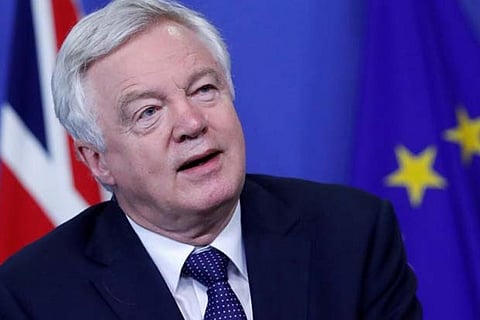

London
Below are key facts about Davis’ role in government and why he was an important ally for Prime Minister Theresa May:
* Davis, 69, was a surprise appointment to May’s cabinet when she took power in 2016, shortly after Britons had voted in favour of leaving the European Union. He had not held a government post for 19 years prior to his appointment.
He took on the most senior ministerial role in the newly created Department for Exiting the European Union, and was tasked with negotiating an exit deal with Brussels and a future relationship with the bloc.
* Davis campaigned to leave the European Union during the 2016 referendum, and was one of three leading pro-Brexit Ministers brought back into government by May.
Dubbed ‘the three Brexiteers’, Davis, Foreign Minister Boris Johnson and Trade Minister Liam Fox, were seen as crucial voices representing those who supported Brexit within a cabinet made up of many Ministers who campaigned to stay inside the EU.
* Davis led Britain’s negotiations in Brussels on the terms of the EU divorce, and the future relationship with the bloc. Those talks have all but stalled over difficulties in finding a solution to issues such as the future of the Irish border after Brexit and how goods will flow across it.
* His EU counterpart in the negotiations, Michel Barnier, expressed concerns about Davis’s commitment to the talks, telling colleagues that he did not see his direct involvement as a priority, according to minutes of a meeting released in September 2017.
* Throughout his time in office Davis repeatedly expressed his loyalty to Theresa May, and praised her work on Brexit.
However, he also reportedly threatened to resign from government on a number of occasions, most recently during talks to resolve a dispute with pro-EU Conservative lawmakers who wanted a greater say for parliament over the final Brexit deal.
* His departure leaves May with a difficult task to find a replacement who can win the confidence of the pro-Brexit faction in May’s Conservative Party whilst delivering on a Brexit plan that outraged many of them.
* May leads a minority government which has only a slim majority in parliament thanks to a deal with a smaller party. The Conservatives are deeply split over the type of Brexit Britain should be pursuing, which has made passing any laws preparing for Brexit difficult for the government.
If Davis’ resignation emboldens the faction in favour of a ‘hard Brexit’, she may end up facing a rebellion that could ultimately block her final exit deal when it is put before parliament in a vote expected later this year.
* To trigger a formal leadership challenge, 48 Conservative lawmakers need to write to the chairman of a committee which represents the interests of Conservative members of parliament who are not part of the government.
Visit news.dtnext.in to explore our interactive epaper!
Download the DT Next app for more exciting features!
Click here for iOS
Click here for Android